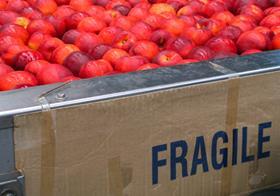
Adverse weather conditions over the past six weeks have created headaches for stonefruit growers and exporters in Italy and Greece, two of Europe's leading suppliers of peaches and nectarines during the summer season.
Poor weather over the past month in Italy's largest stonefruit producing region Emilia-Romagna has resulted in a build-up of supply and, as a result, a major downturn in prices that in some cases means companies are unable to cover the cost of production.
With the processing sector not yet taking significant volumes of peaches and nectarines for juicing and other stonefruit-based products, it would appear the cold conditions that have slowed ripening in many areas could not have come at a worse time, with the global economic recession already placing huge pressure on sales as exports to northern Europe decline.
Short of declaring a crisis, local officials have admitted the season is not going well. 'The situation is certainly worrying, but it is possible we can overcome this bad result,' commented Emilia-Romagna's Agriculture Minister Tiberio Rabboni. 'I believe the supply chain can pass this particular test.'
A meeting involving all members of the industry – including retailers, processing companies, producers and government officials – is due to take place this coming Friday (17 July), at which Mr Rabboni will call upon retailers to recognise the value of Italian peaches and nectarines and to speed up the time it takes them to pay suppliers.
Producer organisations, for their part, will be asked to implement measures designed to limit the volume of fruit on the market, such as diverting a proportion of their output to charities or to green energy projects.
Meanwhile in Greece, unseasonable rainfall has combined with high temperatures to cause problems for growers of peaches, nectarines and apricots.
“We have had constant rainfall, virtually every day since the beginning of June,” revealed Thanos Economou of ACN Naoussa, a group of 10 cooperatives based in Greece. “The combination of rain and heat is very bad for the crops, causing a lot of disease. We have also seen problems with the fruit’s skin and discolouration.”
Athanasios Kotzakolios of peach and nectarine exporter Asepop Velventos said he had experienced similar difficulties. “This season is not going well,” he lamented. “We have seen an unusual amount of rain. Peaches and nectarines cannot take much water. They need sunny weather. Unfortunately, it has been very unstable here – sunny one day, cloudy the next, rainy the day after that. In addition, towards the end of June, there was a lot of hail, which destroyed almost 50 per cent of our production. We hope that the weather will be better from now on.”
Cherry exporter Protofanousi Fruits has also suffered from the unseasonable weather. “From mid-June until the beginning of July, it rained almost every day in our cherry producing area in the northwest of Greece,” explained managing director George Kallitsis. “This affected the quality of our cherries, which are a very delicate fruit. The cherries started to crack and ripened early, and the shelf-life was shortened. The fruit looked tired. This is the fourth year that we have been producing cherries, and we have never experienced weather like this. This is a season that we would like to forget.”



